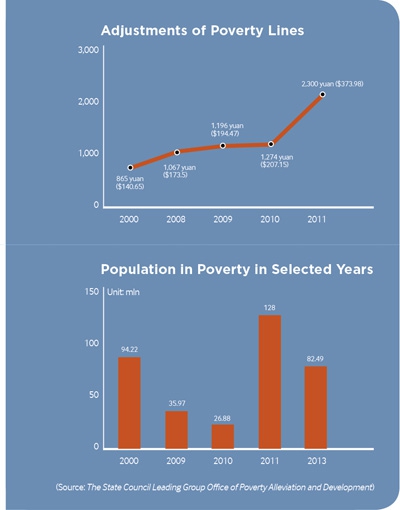

New channels
On December 10 last year, China's first industry fund in poverty-stricken areas was jointly founded by the Ministry of Finance, China National Tobacco Corp. and State Development and Investment Corp.
This is the first such fund with government backing and independent operations, an important move to innovate poverty relief and fiscal investment, the founders said in a joint statement.
The registered capital of the fund amounted to 2.8 billion yuan ($455.28 million), all contributed by the founders. It aims to attract more social funding into featured and potential industries in poverty-stricken areas.
According to a cooperation memorandum, the fund will target farming, animal husbandry, product processing, tourism, forestry, clean energy, logistics, high technology, culture, medical care and natural resources.
"Public finance shall improve the livelihood of people suffering poverty. The fund has made an innovative step in the country's poverty relief work," said Hu Jinglin, Vice Minister of Finance.
Meanwhile, private enterprises are encouraged to participate in poverty alleviation. Social organizations and individuals will also be mobilized to support the poor, according to a circular issued by the State Council in early December last year.
Enterprises investing and creating jobs in poor regions will enjoy more favorable policies in taxation and other fields. Where conditions allow, they will be supported in setting up poverty alleviation funds, the circular read.
China aims to establish an environment where the government, market and society join hands, with all willing participants allowed and able to provide help to the poor, according to the circular.
LGOPAD Director Liu Yongfu said at the conference on December 24 last year that the Central Government is planning to push forward the use of e-commerce platforms to more than 60,000 impoverished villages in the next five years to aid its relief effort.
Residents in poor rural areas will be encouraged to open stores on major e-commerce platforms to distribute their agricultural produce, Liu said. The authority will select 1,500 poverty-stricken villages in 2015 for an e-commerce pilot project.
The e-commerce program is part of the authority's effort to help those with the most pressing needs and to make the most efficient use of poverty reduction funds.
"We should further increase the intensity of our relief efforts, but we should also make sure that efforts will go to those who need it most," he said at the conference.
Several leading e-commerce companies in China have already announced plans to boost their infrastructure and facilities in rural areas to further explore the untapped market.
E-commerce giant Alibaba, for one, announced plans in October last year to invest 10 billion yuan ($1.63 billion) within three to five years to build thousands of facilities in rural China. The move will include 1,000 "county operational centers" and 100,000 "village e-commerce service stations," extending the company's network to one third of China's counties and one sixth of its rural areas.
Copyright ©1999-2018
Chinanews.com. All rights reserved.
Reproduction in whole or in part without permission is prohibited.